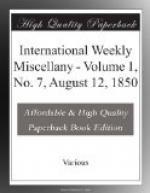In May, 1812, Mr. Perceval fell by the hand of an assassin, and the composition of the ministry necessarily underwent a great change. The result, so far as Mr. Peel was concerned, was, that he was appointed Chief Secretary to the Lord-Lieutenant of Ireland. Mr. Peel had only reached his 26th year when, in the month of September, 1812, the duties of that anxious and laborious position were entrusted to his hands. The legislative union was then but lately consummated, and the demand for Catholic emancipation had given rise to an agitation of only very recent date. But, in proportion to its novelty, so was its vigor. Mr. Peel was, therefore, as the representative of the old tory Protestant school, called upon to encounter a storm of unpopularity, such as not even an Irish secretary has ever been exposed to. The late Mr. O’Connell in various forms poured upon Mr. Peel a torrent of invective which went beyond even his extraordinary performances in the science of scolding. At length he received from Mr. Peel a hostile message. Negotiations went on for three or four days, when Mr. O’Connell was taken into custody and bound over to keep the peace toward all his fellow-subjects in Ireland. Mr. Peel and his friend immediately went to England, and subsequently proceeded to the continent. Mr. O’Connell followed them to London, but the police were active enough to bring him before the chief justice, when he entered into recognizances to keep the peace toward all his majesty’s subjects; and so ended one of the few personal squabbles in which Mr. Peel had ever been engaged. For six years he held the office of chief secretary to the lord-lieutenant, at a time when the government was conducted upon what might be called “anti-conciliation principles.” The opposite course was commenced by Mr. Peel’s immediate successor, Mr. Charles Grant, now Lord Glenelg.




